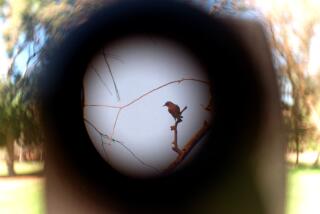NONFICTION - Dec. 24, 1995
- Share via
LAST OF THE CURLEWS by Fred Bodsworth, foreword by W.S. Merwin, afterword by Murray Gell-Mann. (Counterpoint: $15; 174 pp.) This extraordinary book, originally published in 1955, tells the story of one of the last remaining Eskimo curlew’s 9,000-mile migration from the Arctic Circle to South America. Today, ornithologists believe that only 10 to 20 of these shorebirds remain, the rest erased by blitzkrieg hunting in the 1800s and 1900s at every stop along their migratory path; Hudson Bay, the Labrador Coast, the Gulf of St. Lawrence, from Canada to Texas, what Fred Bodsworth calls “The Gantlet.” In the book’s early pages, Bodsworth describes the loneliness of the solitary curlew, which, each mating season, is unable to find another Eskimo curlew and must migrate with a flock of golden plovers. It takes a very little while to get used to the author’s description of the bird’s deep loneliness, trained as we are by the world of science to avoid investing other beings with our own emotions, but in that first italicized passage describing the carnage of a hunt, we put our hearts in the breasts of these astonishing flying creatures and cast our lot with them. Once our hearts are open and involved, we soak in the complicated, sensitive instincts and sheer technological miracle of the bird; recoiling from a female not of its species, knowing when to begin migration, flying 60 hours through gale winds, snow and rain without landing, “performing subconsciously a feat beyond the ken of the highest consciousness in the animal world.” The story of this migration is magnificent, informative, breathtaking and exotic, from the “immense 2-million-square-mile eddy of the mid-Atlantic, where no currents came to stir the brackish water and where the rubbery fronds of sargassum weed collected in the great floating islands of the Sargass, weirdest of all seas,” to the valley of the Orinoco, the Amazon and the snowcapped peaks of the Peruvian Andes. It becomes almost impossible to read the bloody hunting passages, and when the curlew finally finds a mate, only to have her shot by a careless hunter, we feel exhausted, at the end of our rope, extinguished, extinct.
More to Read
Sign up for our Book Club newsletter
Get the latest news, events and more from the Los Angeles Times Book Club, and help us get L.A. reading and talking.
You may occasionally receive promotional content from the Los Angeles Times.








